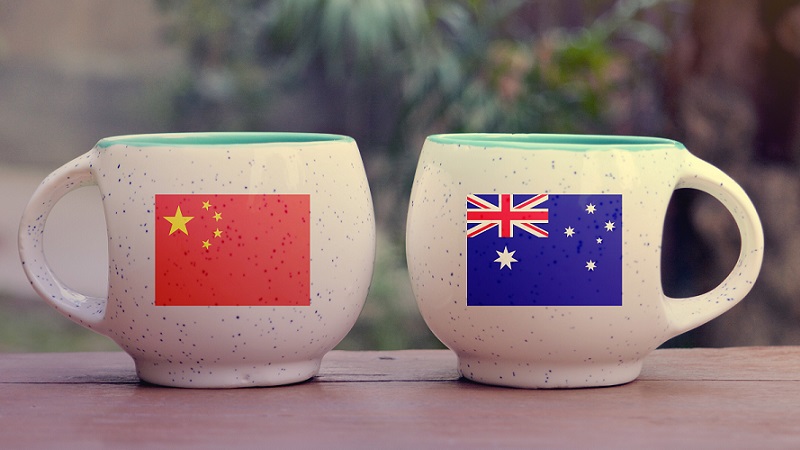The beginnings of a new tone on China?
August 08 2018

Prime Minister Malcolm Turnbull on August 7 delivered a speech to the University of New South Wales (UNSW) which seemed to continue the process of softening some of the sharper rhetoric that had been deployed in public treatment of the Australia-China bilateral relationship since early 2017.[1]
Earlier this year the government went to some trouble to praise the People’s Republic of China’s (PRC) involvement in diplomacy on North Korea.[2] The government also distanced Australia from the US on its characterisation of the PRC as a ‘threat’.[3] Foreign Minister Julie Bishop took the opportunity on July 24, just before the Australia-US Ministerial Consultations (AUSMIN), to spell out in detail why Australia was not drawn to running unilateral freedom of navigation operations in the South China Sea.[4]
With the Prime Minister the shift started in his speech on June 19 to a networking forum hosted by the Australia-China Business Council (ACBC) in Canberra. He said:[5]
I’m filled with optimism about the relationship. I think we should all be positive about it and recognise the strength of the engagement…
While conceding that ‘from time to time, there will be differences in terms of issues’, the go-slow on Australian wine exports to the PRC was the sole acknowledgement of a ‘granular’ issue between the countries in the Prime Minister’s ACBC speech.[6] The Prime Minister opted to focus on accentuating people-to-people ties between Australia and China, and both countries’ commitment to free trade.
In that speech he also appeared to lay some of the blame for current concerns about the bilateral relationship on the media, stating, ‘You can often see a lot more negativity presented than is actually the case’. The Prime Minister said it was ‘important to reinforce the reality’.[7]
In this week’s speech at UNSW the Prime Minister ‘committed to working with China’s leaders to advance our Comprehensive Strategic Partnership…along with ChAFTA’. He made several references to his 2016 visit to China, particularly his meeting in Hangzhou with Chinese President Xi Jinping, quoted President Xi twice and spoke of the President’s ‘historic 2014 visit to Australia’.[8]
The bulk of the Prime Minister’s UNSW speech was dedicated to highlighting the benefits of research cooperation between Australia and China.
This comes against the backdrop of some commentary that had since around June 17 expressed concerns about Australia-China research cooperation[9] and, more broadly, university and research institute opposition[10] to some elements of a June 8 Department of Defence submission recommending an extension of powers in overseeing international research partnerships.[11] This suite of proposed powers includes controlling the supply of all technology to research partners and performing search and seizures without a warrant.
The Prime Minister termed ‘essential’ collaboration between Australian and overseas industry and institutions to deriving ‘the greatest benefits from academic research’. He also said:[12]
Now my own history with China goes back decades…In those days, as now, the partnership between Australians and Chinese - the spirit of collaboration - was absolutely vital.
The Prime Minister underlined his support for UNSW’s collaboration with the PRC via the UNSW Torch Innovation program, which links researchers with PRC companies and the PRC Ministry of Science and Technology. The Prime Minister and Premier Li Keqiang had attended a signing ceremony for the program in Beijing in 2016. The Torch program had been one of the initiatives nominated as potentially problematic in commentary outlining concerns about Australia-China research cooperation.[13]
As in his ACBC speech, the Prime Minister emphasised people-to-people links between the two countries, praising the ‘talented and dynamic contribution of Australians of Chinese descent’, describing the community as ‘a vital thread in the fabric of Australian society’. He also, in broad terms, underlined the importance of international students ‘who, even after they return home, are working on projects that will help deliver benefits to Australia as well.’[14]
In his UNSW address the Prime Minister, while acknowledging differences between the two countries, focused mostly on outlining areas of mutual interest. He nominated ‘tackling the region’s energy challenges’ and working together, with other countries, on global infrastructure investment. On the latter area he pointed to work by the Asia Development Bank and the Asian Infrastructure Bank as good collaborative examples.[15]
In discussing global infrastructure investment, the Prime Minister briefly touched upon the Belt and Road Initiative (BRI):[16]
[W]e look forward to working with China on Belt and Road Initiative projects where, assessing them on their merits, we conclude they’re consistent with our objectives, standards and priorities.
This does not mark any shift in government policy toward the BRI but strikes a slightly warmer note on the initiative than the Prime Minister’s previous characterisation of it on October 23 2017:[17]
[A]n agenda is possibly the best way to describe it…and we obviously welcome Chinese investment that meets our foreign investment guidelines. But we prefer to focus on specifics…rather than engaging in generalities…I prefer to focus on specifics and there is no shortage of Chinese investment and opportunities for that in Australia…
Trade Minister Steven Ciobo had during a speech at an Australia-China Relations Institute function in Canberra on June 28 said the BRI was a ‘key issue on our agenda’.[18]
Prime Minister Turnbull stated the Australian government’s support for ‘an international order based on the rule of law, where might is not right and the sovereignty of all nations is respected by others’.[19] The Prime Minister went on to argue that this was a principle endorsed by President Xi in his address to the Australian parliament in November 2014, and quoted him thus:[20]
The United Nations Charter and the basic norms governing international relations should apply to all countries. With that, countries big or small, strong or weak, rich or poor, are all equal. This means not only equal rights and interests for all countries, but also equality of all countries before international rules.
The Prime Minister in his UNSW speech also appeared to attempt to assuage fears about shifting tectonic plates in global politics:
Rapid change can be unsettling. But it is a big mistake to assume it will inevitably lead to conflict, as Graham Allison theorised with his “Thucydides trap”. Just as it is a mistake to assume that China will assume, vis a vis the United States, the role of the Soviet Union in the Cold War or for that matter, that the United States and its allies would or should seek to contain China.
On China’s rise he said:
Now, will a stronger, richer China have a more confident and assertive voice in world affairs? Of course it will. Will it seek to persuade other countries that its point of view is correct? Will it try to get the best deal it can in trade? Of course it will, like everybody else does.
The Prime Minister’s speech comes just after Foreign Minister Julie Bishop’s meeting with Chinese Foreign Minister Wang Yi on August 4 on the sidelines of the East Asia Summit Foreign Ministers’ Meeting in Singapore.
Following the meeting, China’s Ministry of Foreign Affairs (MFA) released a statement which pointedly opened with the line that the Chinese Foreign Minister had ‘met at request’ with the Australian Foreign Minister. An MFA statement on the ministers’ previous meeting on May 22 led with the same remark.[21] A scan of MFA statements on meetings with other foreign ministers indicates the wording is not a matter of routine.
The statement suggested that the Chinese government view is that it is incumbent on Australia to take the initiative to improve bilateral relations:[22]
It is hoped that the Australian side will meet the Chinese side halfway, take an objective view on China's development, truly regards China's development as an opportunity rather than a threat, and do more things that are conducive to enhancing mutual trust and cooperation between the two sides, so as to create favourable conditions and a sound public opinion environment for the improvement and development of China-Australia relations.
The same statement asserted that Minister Wang reportedly told Minister Bishop, ‘The Chinese side has never interfered in the internal affairs of other countries and will never carry out the so-called infiltration in other countries.’
Following the meeting Minister Wang told a press conference:[23]
[W]e hope that Australia can do more that is in the interest of increasing mutual trust between the two countries, and not be groundlessly suspicious.
Minister Bishop later confirmed Minister Wang’s comments were a reference to Australia’s foreign interference legislation.[24]
At the time of writing, Minister Bishop has not released an official statement on the meeting, nor confirmed the MFA attributing to her in their statement the notion that Australia ‘stands ready to take an objective view on China's development and Australia-China relations, and further send a positive signal in this regard’. However, she told Sky News on August 7:[25]
I believe he [Wang Yi] was referring to our foreign interference legislation. But we had a very positive discussion about the Australia-China bilateral relationship. I know that the line that the media pick up might be the negative line, but the whole discussion was very positive…Both Australia and China can do more to strengthen and deepen our relationship.
Minister Bishop also confirmed that talks were underway to arrange for her to meet with Minister Wang again when they are both in China at the same time.[26] She has not visited China for two years.[27]
Australia’s biggest upcoming decision in the Australia-China space is on whether to ban Huawei from involvement in Australia’s 5G network.
This fact sheet was prepared by Elena Collinson, Senior Project and Research Officer, and Simone van Nieuwenhuizen, Project and Research Officer, Australia-China Relations Institute, University of Technology Sydney.
Sources
[1] See Elena Collinson, ‘Australia’s tilt on China’, Australia-China Relations Institute, University of Technology Sydney, July 4 2017 <http://www.australiachinarelations.org/content/australias-tilt-china>; Simone van Nieuwenhuizen, ‘Australia’s tilt on China: An update’, Australia-China Relations Institute, University of Technology Sydney, December 13 2017 <http://www.australiachinarelations.org/content/australias-tilt-china-update>.
[2] See, e.g., Malcolm Turnbull, Doorstop, Kurnell Visitor Centre, transcript, April 28 2018 <https://www.pm.gov.au/media/doorstop-kurnell-visitor-centre>.
[3] Malcolm Turnbull, Interview with Kieran Gilbert, Sky News, transcript, February 22 2018 <https://www.malcolmturnbull.com.au/media/interview-with-kieran-gilbert-sky-news-22-february-2018>.
[4] Cameron Stewart, ‘US tells Australia to take on China over disputed islands’, The Australian, July 24 2018 <https://www.theaustralian.com.au/national-affairs/foreign-affairs/us-tells-australia-to-take-onchina-over-disputed-islands/news-story/f3905d87f899ef5a91482f7ca5750f04>.
[5] Ibid.
[6] Malcolm Turnbull, Remarks to the Australia-China Business Council, speech, June 19 2018 <https://www.pm.gov.au/media/remarks-australia-china-business-council>.
[7] Ibid.
[8] Malcolm Turnbull, Speech at the University of New South Wales, August 7 2018 <https://www.pm.gov.au/media/speech-university-new-south-wales>.
[9] See, e.g., Danielle Cave and Brendan Thomas-Noone, ‘CSIRO cooperation with Chinese defence contractor should raise questions’, United States Studies Centre, June 3 2017 <https://www.ussc.edu.au/analysis/csiro-cooperation-with-chinese-defence-contractor-should-raise-questions>; Anders Furze and Louisa Lim, ‘Faustian bargain: defence fears over Australian university’s $100m China partnership’, The Guardian, September 19 2017 <https://www.theguardian.com/australia-news/2017/sep/19/faustian-bargain-defence-fears-over-australian-universitys-100m-china-partnership>; Clive Hamilton and Alex Joske, ‘Australian universities are helping China’s military surpass the United States’, The Sydney Morning Herald, October 27 2017 <https://www.smh.com.au/world/australian-universities-are-helping-chinas-military-surpass-the-united-states-20171024-gz780x.html>; Tom Iggulden, ‘Australian universities accused of sharing military technology with China’, ABC News, December 15 2017 <http://www.abc.net.au/news/2017-12-15/universities-sharing-military-technology-with-china/9260496>.
[10] See supplementary submissions to the review of the Defence Trade Controls Act 2012 <http://www.defence.gov.au/publications/reviews/tradecontrols/Submissions.asp>.
[11] Australian Department of Defence, Submission to the review of the Defence Trade Controls Act 2012, June 8 2018 <http://www.defence.gov.au/publications/reviews/tradecontrols/Docs/Dept_of_Defence.pdf>.
[12] Malcolm Turnbull, Speech at the University of New South Wales, August 7 2018 <https://www.pm.gov.au/media/speech-university-new-south-wales>.
[13] Anders Furze and Louisa Lim, ‘’Faustian bargain’: defence fears over Australian university’s $100m China partnership’, The Guardian, September 19 2017 <https://www.theguardian.com/australia-news/2017/sep/19/faustian-bargain-defence-fears-over-australian-universitys-100m-china-partnership>.
[14] Malcolm Turnbull, Speech at the University of New South Wales, August 7 2018 <https://www.pm.gov.au/media/speech-university-new-south-wales>.
[15] Ibid.
[16] Ibid.
[17] Malcolm Turnbull, Doorstop with the Minister for the Environment and Energy and Assistant Minister for Social Services and Multicultural Affairs, transcript, October 23 2017 <https://www.pm.gov.au/media/doorstop-minister-environment-and-energy-and-assistant-minister-social-services-and>.
[18] Steven Ciobo, ‘China-Australia Free Trade Agreement: Future opportunities’, speech, Australia-China Relations Institute, June 28 2018 <http://www.australiachinarelations.org/content/china-australia-free-trade-agreement-future-opportunities>.
[19] Note: The Australian government does not tend to use the phrase ‘international order based on rule of law’. The preferred terminology is ‘rules-based international order’, which featured throughout the 2017 Foreign Policy White Paper.[19] Further, the Chinese government’s use of a similar term, ‘rule of law in international relations’, appears to reflect its conception of rule of law in its domestic context, which diverges from Australia’s understanding of what constitutes ‘rule of law’. See Simone van Nieuwenhuizen, ‘China’s ‘rule of law in international relations’’, Lowy Interpreter, August 1 2018 <https://www.lowyinstitute.org/the-interpreter/chinas-rule-law-international-relations>.
[20] Malcolm Turnbull, Speech at the University of New South Wales, August 7 2018 <https://www.pm.gov.au/media/speech-university-new-south-wales>.
[21] PRC Ministry of Foreign Affairs, Wang Yi meets with Foreign Minister Julie Bishop of Australia, statement, May 22 2018 <http://www.fmprc.gov.cn/mfa_eng/zxxx_662805/t1562057.shtml>.
[22] PRC Ministry of Foreign Affairs, Wang Yi meets with Foreign Minister Julie Bishop of Australia, statement August 4 2018 <http://www.fmprc.gov.cn/mfa_eng/zxxx_662805/t1583576.shtml>.
[23] Reuters staff, ‘China diplomat says hopes ties with Australia return to health soon’, Reuters, August 4 2018 <https://www.reuters.com/article/asean-singapore-china-australia/china-diplomat-says-hopes-ties-with-australia-return-to-health-soon-idUSL4N1UV050>.
[24] Sky News, ‘Bishop concedes China and Australia can ‘do more’ to strengthen ties’, Sky News, August 7 2018 <https://www.skynews.com.au/details/_5818770689001>.
[25] Ibid.
[26] Ibid.
[27] Phillip Coorey, ‘Malcolm Turnbull hits reset button over China’, Australian Financial Review, August 7 2018 <https://www.afr.com/news/malcolm-turnbull-hits-reset-button-over-china-20180806-h13mq7>.


